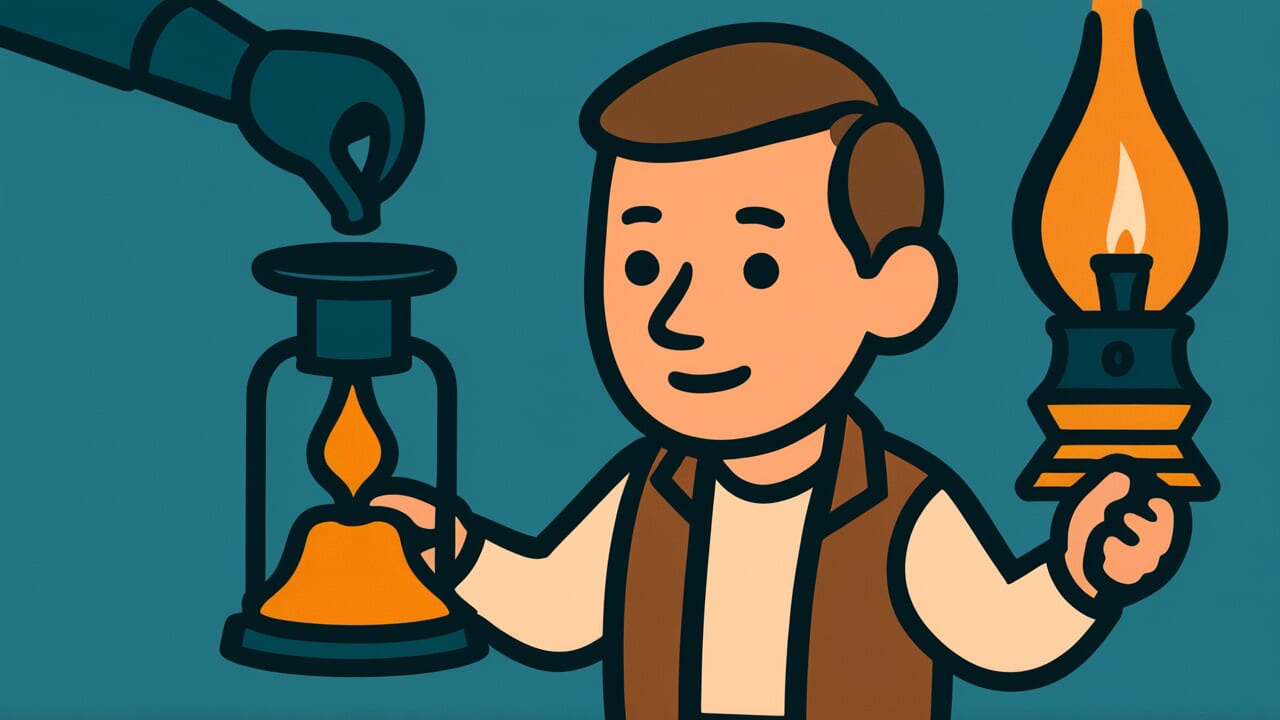How to Read “Use less wick and more oil”
Tōshin wo sukunaku shite abura wo ōku seyo
Meaning of “Use less wick and more oil”
This proverb teaches us to avoid waste and focus our resources on what truly matters. It means we should invest in the essential, lasting parts of things rather than spending on superficial appearances or temporary effects.
This saying is used when planning a business or project. Instead of spending your budget on flashy advertising or appearances, you should invest in core elements like product quality or employee training.
In personal life, it applies too. Rather than spending money to impress others, you should invest in things that build your future, like education or health.
Today, people spend more on social media appearances and temporary satisfaction. This makes the proverb’s message even more important.
Even if you cut back on visible parts, enriching what truly matters brings richer, longer-lasting results. This is the wisdom our ancestors condensed into these words.
Origin and Etymology
The exact source of this proverb is unclear. However, it likely emerged from the wisdom of common people during the Edo period.
Back then, oil lamps called andon or tomyo provided light at night. These lamps worked by placing oil in a dish and soaking a wick in it, then lighting the wick.
The wick was made from the pith of a plant called tōsō, split into thin strips. A thicker wick burned brighter but consumed oil quickly. A thinner wick gave less light but made the oil last longer.
To maintain the same brightness for a long time, it was wiser to use a thin wick with plenty of oil.
This practical knowledge eventually evolved into a broader life lesson. Instead of seeking immediate flashiness or glamour (a thick wick), secure the resources you truly need (oil).
Edo people learned to see the essence of things through how they used everyday tools. The ingenuity to maximize limited resources was wisdom sharpened by an era that didn’t allow luxury.
Usage Examples
- For our new business, let’s keep advertising costs down and follow “Use less wick and more oil” by putting our budget into product development
- What matters is the content, not fancy appearances. As they say, “Use less wick and more oil”
Universal Wisdom
Humans have a tendency to be captivated by visible parts and immediate results. We reach for things that shine brightly and stand out boldly.
But what truly matters is the invisible part that supports that shine.
This proverb has been passed down for so long because it sees through this human weakness. We repeat the same mistakes over and over.
We become obsessed with decorating the surface while the foundation remains fragile and collapses. We chase temporary satisfaction and lose sight of sustainable happiness. We’re dazzled by glamour and dismiss the plain but reliable path.
Our ancestors tried to convey this truth through the familiar tool of lamplight used in daily life. A thick wick burns bright but quickly exhausts the oil. A thin wick is modest but keeps burning long.
Which represents true abundance?
This question never fades, no matter how times change. The conflict between the desire to “shine right now” and the wish to “build long-lasting, stable happiness” remains constant across all eras.
This proverb offers one answer to that conflict.
When AI Hears This
Making the wick thicker creates a larger flame and more light, but the oil burns out quickly. This is a problem of “energy dissipation rate” in thermodynamics.
Even with the same amount of oil as an energy resource, the duration changes dramatically depending on how fast you use it.
What’s interesting is that doubling the wick doesn’t double the brightness. A wick twice as thick only produces about 1.5 times the light.
This happens because as the flame grows larger, more energy escapes as heat instead of converting to light. This is “entropy increase” shown by the second law of thermodynamics—increased wasteful energy dissipation.
Modern smartphone battery management uses the same principle. High brightness mode is certainly bright, but battery consumption increases exponentially.
That’s why power-saving mode reduces screen brightness. It maintains 70% of the needed function (brightness) while cutting energy consumption by more than half.
Human activity works the same way. Sprinting consumes sugar and oxygen dozens of times faster than resting, but only moves you a few times farther.
How do you efficiently use low-entropy resources like body energy for as long as possible? Edo period people intuitively understood this fundamental law governing the universe through the everyday experience of conserving oil.
Lessons for Today
This proverb teaches modern people the importance of developing an eye for “what deserves your effort.” Likes on social media, owning brand-name goods, impressive job titles.
Modern society overflows with flashy shine like thick wicks. But do these things truly enrich your life?
What matters is knowing what your “oil” is—your real resources. It might be time. It might be money. Or it might be your passion and energy.
Where will you invest those limited resources? Will you exhaust them for superficial shine, or use them carefully for what truly has value?
For example, when studying for a certification, spend time on actual learning rather than posting progress on social media for approval.
In relationships, build a few deep, trusting connections rather than many shallow ones. At work, prioritize building solid skills over visible achievements.
These choices become the light that continues illuminating your life for a long time.



Comments